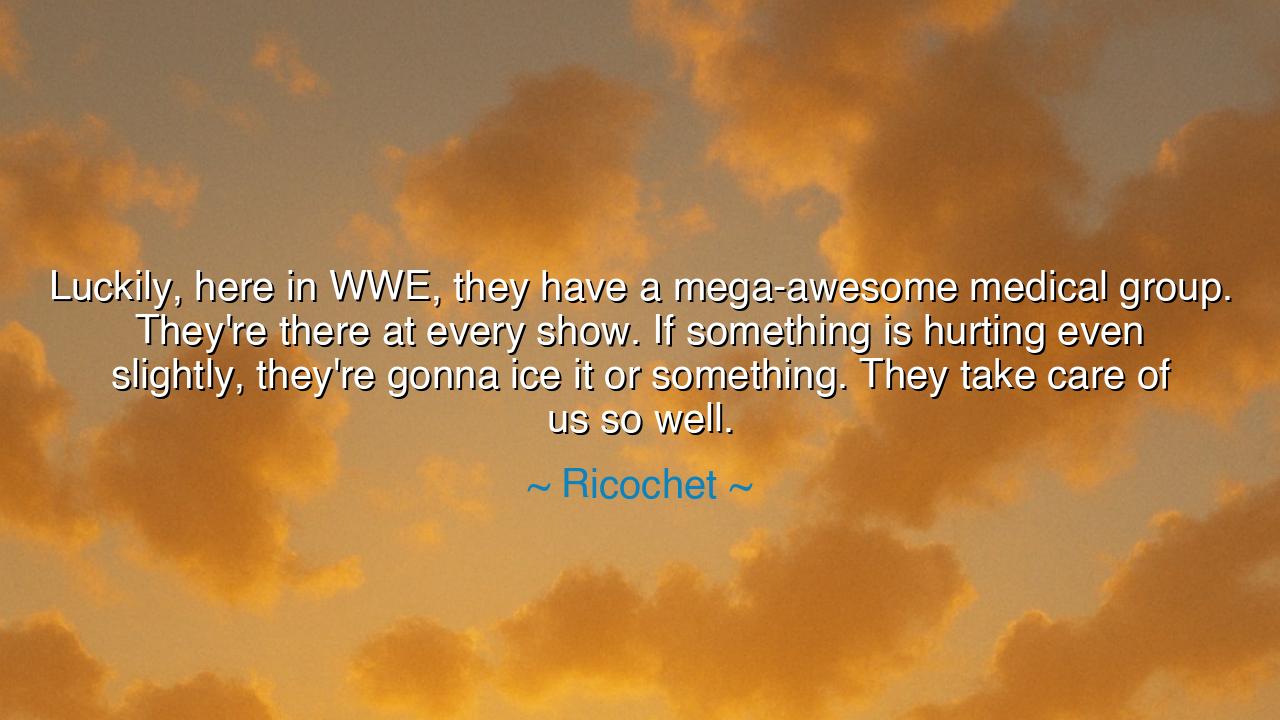
Luckily, here in WWE, they have a mega-awesome medical group.
Luckily, here in WWE, they have a mega-awesome medical group. They're there at every show. If something is hurting even slightly, they're gonna ice it or something. They take care of us so well.






The words of Ricochet, the aerial warrior of the wrestling ring, carry both gratitude and revelation: “Luckily, here in WWE, they have a mega-awesome medical group. They’re there at every show. If something is hurting even slightly, they’re gonna ice it or something. They take care of us so well.” Though spoken with humility and simplicity, these words rise beyond the world of sport—they echo an eternal truth about care, community, and the unseen hands that guard those who dare to strive. They remind us that behind every act of courage, there must be those who heal; behind every spectacle of strength, there must be those who protect.
In the arenas of old—whether the gladiator’s coliseum, the battlefield, or the stage of performance—heroes were revered for their valor, but the healers were often forgotten. Yet it was they who stood in the shadow of victory, tending to the broken and restoring the fallen. So too in the WWE, where the body becomes both weapon and art, the medical team are the unseen guardians. They are the quiet priests of recovery, standing ready while the crowd roars for glory. Ricochet’s words are an ode to these healers, who make endurance possible, who ensure that courage can rise again after every fall.
There is great wisdom in the gratitude he expresses, for it reveals an understanding that strength is not born of solitude, but of support. No warrior—no matter how mighty—stands alone. The medical group, ever-present, represents the sacred bond between those who act and those who sustain. This is not merely about medicine or injury; it is about trust. The performer entrusts his body, the vessel of his craft, to another’s care. That trust, built upon respect and compassion, forms the invisible foundation of every enduring endeavor. Without such care, even the strongest flame would burn out too soon.
Consider the ancient tale of Achilles, the greatest of warriors. His power was unmatched, yet his downfall came from a single wound left untended. His story is not just one of pride, but of the fragility that all mortals share. Had he possessed the healers and caretakers that Ricochet honors, perhaps his legend would have ended not in sorrow, but in wisdom. The ancients understood: a hero’s greatest strength is not in his speed or his sword, but in his ability to be made whole again. Healing, not battle, is the true measure of resilience.
In our time, the stage may have changed—the battlefield replaced by the ring, the sword by the performance—but the essence remains. The WWE is a realm where athletes become living myths, where the line between pain and triumph is thin as breath. For such warriors, every leap, every impact, carries the risk of ruin. Yet Ricochet speaks not of fear, but of faith in those who stand ready to restore him. This faith is the quiet heartbeat of all greatness: the recognition that care sustains courage, and that no victory is noble if it is not tempered by compassion.
The spirit of his words also reminds us that even in glory, humility is the highest virtue. To acknowledge those who heal you is to remain grounded in humanity. Many rise to fame and forget the hands that lifted them; few remember to bow in thanks. Ricochet’s gratitude shines as a lesson to all who achieve—to never forget the invisible pillars that hold us aloft: the mentors, the caretakers, the family, and the unseen healers of both body and soul.
And so, my child of strength, learn from this truth: greatness is not only in the leap that defies gravity but in the gratitude that honors those who make the leap possible. Whatever your field—be it art, labor, or battle—remember the ones who take care of you, the ones who tend your wounds when the lights fade and the crowd disperses. To thank them is not merely politeness; it is the mark of true nobility.
For as the ancients taught, the mightiest warrior is not the one who never falls, but the one who knows how to rise, healed and humbled. Let us, then, live as Ricochet teaches—not only bold in pursuit, but thankful in spirit—remembering always that no triumph is won alone, and that behind every hero, there stands the healer who makes their return to glory possible.






AAdministratorAdministrator
Welcome, honored guests. Please leave a comment, we will respond soon